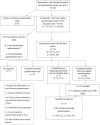Perceived patient burden and acceptability of whole body MRI for staging lung and colorectal cancer; comparison with standard staging investigations
- PMID: 29528257
- PMCID: PMC6223281
- DOI: 10.1259/bjr.20170731
Perceived patient burden and acceptability of whole body MRI for staging lung and colorectal cancer; comparison with standard staging investigations
Abstract
Objective: To evaluate perceived patient burden and acceptability of whole body MRI (WB-MRI) compared to standard staging investigations, and identify predictors of reduced tolerance.
Methods: Patients recruited to multicentre trials comparing WB-MRI with standard staging scans for lung and colorectal cancer were invited to complete two questionnaires: a baseline questionnaire at recruitment, measuring demographics, comorbidities, and distress; and a follow-up questionnaire after staging, measuring recovery time, comparative acceptability/satisfaction between WB-MRI and CT (colorectal cancer) and PET-CT (lung cancer), and perceived scan burden (scored 1, low; 7, high). Results: 115 patients (median age 66.3 years; 67 males) completed follow up and 103 baseline questionnaires. 69 (63.9%) reported "immediate" recovery from WB-MRI and 73 (65.2%) judged it "very acceptable". Perceived WB-MRI burden was greater than for CT (p < 0.001) and PET-CT (p < 0.001). High distress and comorbidities were associated with greater WB-MRI burden in adjusted analyses, with deprivation only approaching significance (adjusted regression β = 0.223, p = 0.025; β = 0.191, p = 0.048; β = -0.186, p = 0.059 respectively). Age (p = 0.535), gender (p = 0.389), ethnicity (p = 0.081) and cancer type (p = 0.201) were not predictive of WB-MRI burden.
Conclusion: WB-MRI is marginally less acceptable and more burdensome than standard scans, particularly for patients with pre-existing distress and comorbidities. Advances in knowledge: This research shows that WB-MRI scan burden, although low, is higher than for current staging modalities among patients with suspected colorectal or lung cancer. Psychological and physical comorbidities adversely impact on patient experience of WB-MRI. Patients with high distress or comorbid illness may need additional support to undergo a WB-MRI.
Figures
References
-
- Usuda K, Sagawa M, Maeda S, Motono N, Tanaka M, Machida Y, et al. . Diagnostic performance of whole-body diffusion-weighted imaging compared to PET-CT plus brain MRI in staging clinically resectable lung cancer. Asian Pac J Cancer Prev 2016; 17: 2775–80. - PubMed
MeSH terms
Grants and funding
LinkOut - more resources
Full Text Sources
Other Literature Sources
Medical


